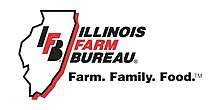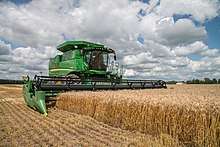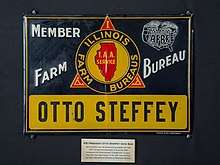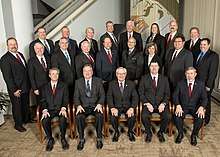Illinois Farm Bureau
The Illinois Farm Bureau (IFB) is a nonprofit U.S. organization controlled by farmers who join IFB through one of the 96 county Farm Bureaus in Illinois. The organization's legal name is the Illinois Agricultural Association. IFB was founded in 1916 by a group of farmers who met at the University of Illinois to discuss the need for agricultural education, better information for farmers, and more effective farming practices. Today, IFB represents two out of three Illinois farmers. It is a member of the American Farm Bureau Federation. IFB is the founder of Country Financial.

Organization and mission

The Illinois Farm Bureau is a cooperative, grassroots organization that aims to be a voice for the farmer in local, state and national affairs. Farmer leadership is responsible for Illinois Agricultural Association (IAA) activities. Illinois Farm Bureau's mission is to improve the economic well-being of agriculture and enrich the quality of farm family life.
In 1922, at the Illinois Farm Bureau Annual Meeting, "a system of statewide cooperatives, insurance companies, and other agricultural-related businesses were established to ensure adequate and reasonably priced supplies and service under control of farmers."[1] Thus began the formation of the family of companies as we know it today. Affiliated organizations under the cooperative umbrella known as the family of companies, along with Illinois Farm Bureau, are: AgriVisor Services Inc, COUNTRY Financial, GROWMARK, IAA Credit Union, IAA Foundation, Illinois Farm Families, Illinois Milk Producers Association, Illinois Specialty Growers Association, Illinois Wheat Association and Prairie Farms Dairy.
Farm Bureau's mission statement is "To improve the economic well-being of agriculture and enrich the quality of farm family life."
The Illinois Farm Bureau home office is located in Bloomington, Illinois.
History

On July 2, 1862, Abraham Lincoln signed the Morrill Land-Grant College Act into law. Through this monumental act, Congress was able to begin the process of providing advanced education to America’s farmers. Johnathan Baldwin Turner's Land Grant University, now known as the University of Illinois, directly led to the formation of the Illinois Farm Bureau. The monumental legislation behind Land Grants helped shape American agriculture during the largest political crisis in history, the Civil War.
In May of 1862, the Homestead Act was signed into law and began creating new opportunities in agriculture for thousands of people. The transcontinental railroad was also authorized by Congress at this time, allowing for agriculture to become the biggest business in America. The Smith Lever Act passed in 1914 not only played a vital role in agricultural education and the creation of the United States Extension Service, but the founding of the Illinois Agricultural Association, or Illinois Farm Bureau, in 1916.
DeKalb, Kankakee, McHenry, Livingston, Will, DuPage, Kane and Tazewell counties all had organizations in place to assist in educating America's farmers. However, Tazewell County is credited with being the first county to use the name, "Illinois Farm Bureau." The Tazewell County Farm Bureau employed its first farm advisor on June 1, 1913.
Sears Roebuck was instrumental in aiding county Farm Bureaus by offering $1000 grants to allow them to begin work throughout the county. By 1913, it was clear that there was a need for a statewide association, so on July 1, 1913, county advisors convened in Pontiac, Illinois, to discuss problems and experiences. By December of 1913, in Champaign, Illinois, the statewide association was created and named the Illinois Association of County Agriculturalists. By mid-1914, the association was up from just four to thirteen members. Soon, the Illinois Association of County Agriculturalists was changed to what we know today, the Illinois Agricultural Association. In 1916, Herman Danforth was elected as the first IAA president.
There were 13 charter members to the IAA that hailed from Adams, Bureau, Champaign, DeKalb, Iroquois, LaSalle, Livingston, Macon, Mason, McLean, Tazewell, Will and Woodford counties.
The American Farm Bureau Federation was formed on November 12, 1919, in Chicago, Illinois.
At the 1922 Illinois Farm Bureau Annual Meeting, it was decided that it was necessary for the organization to improve "net farm income." Over the next 20 years, IFB would become a "system of statewide cooperatives, insurance companies, and other agriculture-related businesses" that were created to ensure certain services that met the needs of Illinois farmers were available at an affordable price.
In 2016, Illinois Farm Bureau celebrated its 100th birthday.
Illinois Farm Bureau leadership

Illinois Farm Bureau Presidents:
- (1919) H.J. Sconce
- (1920–1922) Howard Leonard
- (1923–1925) S.H. Thompson
- (1926–1945) Earl C. Smith
- (1946–1954) Charles B. Shuman
- (1955–1957) Otto Steffey
- (1958–1970) William J. Kuhfuss
- (1971–1983) Harold B. Steele
- (1984–1993) John White, Jr.
- (1994–2003) Ronald Warfield
- (2004–2012) Philip Nelson
- (2013–present) Richard Guebert, Jr.
Illinois Farm Bureau Vice Presidents:
- (1919) J.C. Sailor
- (1920–1921) Z.M. Holmes
- (1922) S.H. Thompson
- (1923) A.O. Eckhert
- (1924) Chauncy B. Watson
- (1925) H.E. Goembel
- (1926) Charles R. Finley
- (1927–1929) Frank D. Barton
- (1930–1934) A.R. Wright
- (1935–1945) Talmage DeFrees
- (1946–1951) Floyd E. Morris
- (1952–1954) Otto Steffy
- (1955) Wilfred Shaw
- (1956) Charles J. Elliott
- (1957) Wilfred J. Kuhfuss
- (1958–1962) Edwin J. Gumm
- (1963–1970) Harold E. Hartley
- (1971–1973) William H. Sauer
- (1974–1983) John White, Jr.
- (1984–1989) Kendall P. Cole
- (1990–1991) Enid Schlipf
- (1992–1993) Alan Dale
- (1994–1999) Rollie Moore
- (2000–2003) Philip Nelson
- (2003–2012) Richard Guebert, Jr.
- (2013–2017) David C. Erickson
- (2018–present) Brian Duncan
Current Illinois Farm Bureau Board of Directors:
- District 1 – Michele Aavang
- District 2 – Earl Williams, Jr.
- District 3 – Jeff Kirwan
- District 4 – Brad Temple
- District 5 – Tammy Halterman
- District 6 – Randy Poskin
- District 7 – David Meiss
- District 8 – David Serven
- District 9 – Gary Speckhart
- District 10 – Mark Reichert
- District 11 – Robert Klemm
- District 12 – Steve Fourez
- District 13 – Dennis Green
- District 14 – Ken Cripe
- District 15 – Chad Schutz
- District 16 – Steve Stallman
- District 17 – Larry Miller
- District 18 – Kenton Thomas
- IFBYL Rep – Kaylee Heap
- IEAA Rep – Richard Hentschel
References
- Leifel, D., Gangler, P., Simms, S., Carr, A., & Bender, A. (2015). A Voice for Illinois Agriculture: The Centennial History of Illinois Farm Bureau. Bloomington, IL: Illinois Agriculture Association.
External links
- Leifel, D., Gangler, P., Simms, S., Carr, A., & Bender, A. (2015). A voice for Illinois agriculture: The centennial history of Illinois Farm Bureau. Bloomington, IL: Illinois Agriculture Association.
- Illinois Farm Bureau website
- IAA final resting place for ‘Lady’ - Pantagraph (Bloomington, Illinois newspaper)